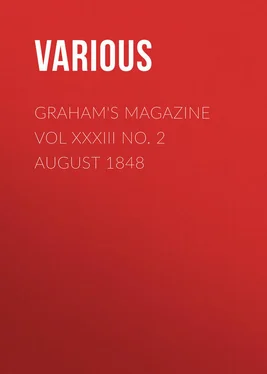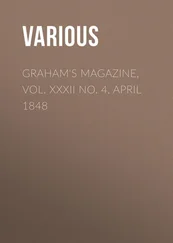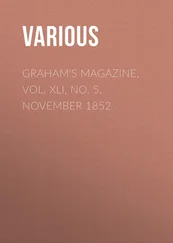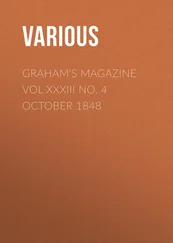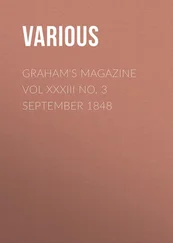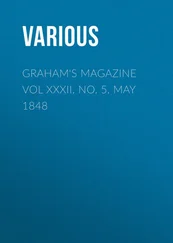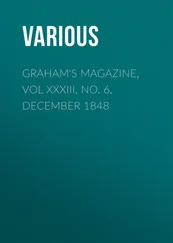Various - Graham's Magazine Vol XXXIII No. 2 August 1848
Здесь есть возможность читать онлайн «Various - Graham's Magazine Vol XXXIII No. 2 August 1848» — ознакомительный отрывок электронной книги совершенно бесплатно, а после прочтения отрывка купить полную версию. В некоторых случаях можно слушать аудио, скачать через торрент в формате fb2 и присутствует краткое содержание. Издательство: Иностранный паблик, Жанр: periodic, literature_19, foreign_edu, на английском языке. Описание произведения, (предисловие) а так же отзывы посетителей доступны на портале библиотеки ЛибКат.
- Название:Graham's Magazine Vol XXXIII No. 2 August 1848
- Автор:
- Издательство:Иностранный паблик
- Жанр:
- Год:неизвестен
- ISBN:нет данных
- Рейтинг книги:5 / 5. Голосов: 1
-
Избранное:Добавить в избранное
- Отзывы:
-
Ваша оценка:
- 100
- 1
- 2
- 3
- 4
- 5
Graham's Magazine Vol XXXIII No. 2 August 1848: краткое содержание, описание и аннотация
Предлагаем к чтению аннотацию, описание, краткое содержание или предисловие (зависит от того, что написал сам автор книги «Graham's Magazine Vol XXXIII No. 2 August 1848»). Если вы не нашли необходимую информацию о книге — напишите в комментариях, мы постараемся отыскать её.
Graham's Magazine Vol XXXIII No. 2 August 1848 — читать онлайн ознакомительный отрывок
Ниже представлен текст книги, разбитый по страницам. Система сохранения места последней прочитанной страницы, позволяет с удобством читать онлайн бесплатно книгу «Graham's Magazine Vol XXXIII No. 2 August 1848», без необходимости каждый раз заново искать на чём Вы остановились. Поставьте закладку, и сможете в любой момент перейти на страницу, на которой закончили чтение.
Интервал:
Закладка:
In December, 1843, Mrs. Brooks sailed the last time from her native country for the Island of Cuba. There, on her coffee estate, Hermita, she renewed for a while her literary labors. The small stone building, smoothly plastered, with a flight of steps leading to its entrance, in which she wrote some of the cantos of "Zophiël," is described by a recent traveler 3 3 The author of "Notes on Cuba." Boston, 1844.
as surrounded by alleys of "palms, cocoas, and oranges, interspersed with the tamarind, the pomegranate, the mangoe, and the rose-apple, with a back ground of coffee and plantains covering every portion of the soil with their luxuriant verdure. I have often passed it," he observes, "in the still night, when the moon was shining brightly, and the leaves of the cocoa and palm threw fringe-like shadows on the walls and the floor, and the elfin lamps of the cocullos swept through the windows and door, casting their lurid, mysterious light on every object, while the air was laden with mingled perfume from the coffee and orange, and the tube-rose and night-blooming ceres, and have thought that no fitter birth-place could be found for the images she has created."
Her habits of composition were peculiar. With an almost unconquerable aversion to the use of the pen, especially in her later years, it was her custom to finish her shorter pieces, and entire cantos of longer poems, before committing a word of them to paper. She had long meditated, and had partly composed, an epic under the title of "Beatriz, the Beloved of Columbus," and when transmitting to me the MS. of "The Departed," in August, 1844, she remarked: "When I have written out my 'Vistas del Infierno' and one other short poem, I hope to begin the penning of the epic I have so often spoken to you of; but when or whether it will ever be finished, Heaven alone can tell." I have not learned whether this poem was written, but when I heard her repeat passages of it, I thought it would be a nobler work than "Zophiël."
Mrs. Brooks died at Patricio, in Cuba, near the close of December, 1844.
I have no room for particular criticism of her minor poems. They will soon I trust be given to the public in a suitable edition, when it will be discovered that they are heart-voices, distinguished for the same fearlessness of thought and expression which is illustrated by the work which has been considered in this brief reviewal.
The accompanying portrait is from a picture by Mr. Alexander, of Boston, and though the engraver has very well preserved the details and general effect of the painting, it does little justice to the fine intellectual expression of the subject. It was a fancy of Mr. Southey's that induced her to wear in her hair the passion-flower, which that poet deemed the fittest emblem of her nature.
THE CRUISE OF THE RAKER
CHAPTER I
It was a dark and cloudy afternoon near the close of the war of 1812-15. A little vessel was scudding seaward before a strong sou'wester, which lashed the bright waters of the Delaware till its breast seemed a mimic ocean, heaving and swelling with tiny waves. As the sky and sea grew darker and darker in the gathering shades of twilight, the little bark rose upon the heavy swell of the ocean, and meeting Cape May on its lee-beam, shot out upon the broad waste of waters, alone in its daring course, seeming like the fearless bird which spreads its long wings amid the fury of the storm and the darkness of the cloud.
Upon the deck, near the helm, stood the captain, whom we introduce to our readers as George Greene, captain of the American privater, Raker. He was a weather-bronzed, red-cheeked, sturdy-built personage, with a dark-blue eye, the same in color as the great sea over which it was roving with an earnest and careful glance, rather as if in search of a strange sail, than in apprehension of the approaching storm. His countenance denoted firmness and resolution, which he truly possessed in an extraordinary degree, and his whole appearance was that of a hardy sailor accustomed to buffet with the storm and laugh at the fiercest wave.
It was evident that a bad night was before them, and there were some on board the little privateer who thought they had better have remained inside the light-house of Cape May, than ventured out upon the sea. The heavy masses of black clouds which were piled on the edge of the distant horizon seemed gradually gathering nearer and nearer, as if to surround and ingulf the gallant vessel, which sped onward fearlessly and proudly, as if conscious of its power to survive the tempest, and bide the storm.
Captain Greene's eye was at length attracted by the threatening aspect of the sky, and seizing his speaking-trumpet he gave the orders of preparation, which were the more promptly executed inasmuch as they had been anxiously awaited.
"Lay aloft there, lads, and in with the fore to'gallant-sail and royal – down with the main gaff top-sail! – bear a hand, lads, a norther on the Banks is no plaything! Clear away both cables, and see them bent to the anchors – let's have all snug – lower the flag from the gaff-peak, and send up the storm-pennant, there – now we are ready."
A thunder-storm at sea is perhaps the sublimest sight in nature, especially when attended with the darkness and mystery of night. The struggling vessel plunges onward into the deep blackness, like a blind and unbridled war-horse. All is dark – fearfully dark. Stand with me, dear reader, here in the bow of the ship! make fast to that halliard, and share with me in the glorious feelings engendered by the storm which is now rioting over the waters and rending the sky. We hear the fierce roar of the contending surges, yet we see them not. We hear the quivering sails and strained sheets, creaking and fluttering like imprisoned spirits, above and around us, but all is solemnly invisible; now, see in the distant horizon the faint premonitory flush of light, preceding the vivid lightning flash – now, for a moment, every thing – sky – water – sheet – shroud and spar are glowing with a brilliancy that exceedeth the brightness of day – the sky is a broad canopy of golden radiance, and the waves are crested with a red and fiery surge, that reminds you of your conception of the "lake of burning fire and brimstone." We feel the dread – the vast sublimity of the breathless moment, and while the mighty thoughts and tumultuous conceptions are striving for form and order of utterance within our throbbing breasts – again all is dark – sadly, solemnly dark. Is not the scene – is not the hour, truly sublime?
There was one at least on board the little Raker, who felt as we should have felt, dear reader – a sense of exultation, mingled with awe. It is upon the ocean that man learns his own weakness, and his own strength – he feels the light vessel trembling beneath him, as if it feared dissolution – he hears the strained sheets moaning in almost conscious agony – he sees the great waves dashing from stem to stern in relentless glee, and he feels that he is a sport and a plaything in the grasp of a mightier power; he learns his own insignificance. Yet the firm deck remains – the taut sheets and twisted halliards give not away; and he learns a proud reliance on his own skill and might, when he finds that with but a narrow hold between him and death, he can outride the storm, and o'ermaster the wave.
Such were the thoughts which filled the mind of Henry Morris, as he stood by the side of Captain Greene on the quarter-deck of the Raker; as he stood with his left arm resting on the main-boom, and his gracefully turned little tarpaulin thrown back from a broad, high forehead, surrounded by dark and clustering curls, and with his black, brilliant eyes lighted up with the enthusiasm of thought, he presented a splendid specimen of an American sailor. The epaulette upon his shoulder denoted that he was an officer; he was indeed second in command in the privateer. He was a native of New Jersey, and his father had been in Revolutionary days one of the "Jarsey Blues," as brave and gallant men as fought in that glorious struggle.
Читать дальшеИнтервал:
Закладка:
Похожие книги на «Graham's Magazine Vol XXXIII No. 2 August 1848»
Представляем Вашему вниманию похожие книги на «Graham's Magazine Vol XXXIII No. 2 August 1848» списком для выбора. Мы отобрали схожую по названию и смыслу литературу в надежде предоставить читателям больше вариантов отыскать новые, интересные, ещё непрочитанные произведения.
Обсуждение, отзывы о книге «Graham's Magazine Vol XXXIII No. 2 August 1848» и просто собственные мнения читателей. Оставьте ваши комментарии, напишите, что Вы думаете о произведении, его смысле или главных героях. Укажите что конкретно понравилось, а что нет, и почему Вы так считаете.
